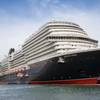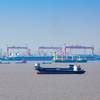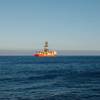The rapidly changing environment of the liquefied natural gas (LNG) market is leading to a whole new game of risk for P&I clubs, according to the ‘A’ rated, 75 million GT North of England P&I club.
Commenting in the latest issue of the club’s newsletter North News, director Mike Salthouse says, ‘the LNG industry is going through a radical change, which has dramatic implications for the way in which LNG ships operate ‒ and the risks involved.’
Salthouse says ownership of the world’s rapidly growing fleet of LNG vessels has diversified significantly recently to meet the anticipated global growth in gas use, and the new players are planning to operate the ships quite differently.
‘The LNG industry used to revolve around capital-intensive projects, with shipping playing a relatively minor part ‒ all that the vessels were required to do was go backwards and forward between two set terminals for which they had been specifically designed and built,’ he says.
In anticipation of a spot market, Salthouse says the new LNG carriers are being designed and equipped to be more flexible as they are likely to be calling at a number of different ports and terminals. ‘As such the operational risks may be greater. LNG operators will need their P&I clubs ‒ as with all their service providers ‒ to be able to look forward and understand the new market environment in which they trade’.
According to North of England, the worldwide LNG fleet stood at 217 vessels at the beginning of 2007. A large number of new ships are scheduled for delivery over the coming years and the club has seen little evidence of scrapping.
‘LNG shipping has a remarkably good record for providing safe and reliable transport but, given the current growth, in particular in the volume of short-term trades, the risk profile of the industry will change,’ says senior claims executive and former LPG carrier master, John Owen. ‘It is going to be a very different game ‒ everybody is learning and gaining experience as they go along.’
Owen says that as new terminals come on stream, owners are increasingly being required to accept a greater share of the risk associated with use of such facilities. ‘And as a market develops for short-term charters, the ships and their crews are required to have an unprecedented level of operational flexibility,’ he says.
North of England’s LNG team, of which both Salthouse and Owen are members, has set up an ongoing training programme to keep abreast of industry developments and is liaising closely with entered LNG operators on the legal, technical and operational changes they are currently facing.
Sponsored Content
Chris-Marine’s solutions help to prolong engine lifetime

Subscribe for
Maritime Reporter E-News
Maritime Reporter E-News is the maritime industry's largest circulation and most authoritative ENews Service, delivered to your Email five times per week









